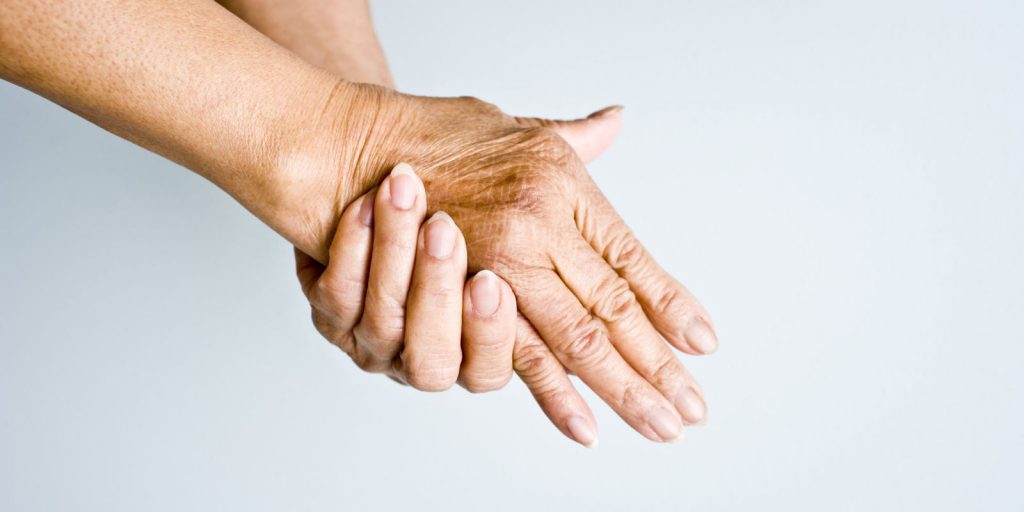Cannabinoids in the treatment of rheumatoid arthritis,” cautiously concludes that “cannabinoids could be a suitable treatment for RA.” The authors also suggest a series of molecular approaches that merit future clinical studies.
But while scientists continue to debate the potential suitability of cannabis for RA, outside the ivory tower, countless millions are already using cannabis to treat their aching joints and muscles, as people have been doing for millennia. This reversal of the typical drug-development process is characteristic of the peculiar evolution of cannabis medicine, which is now legal in 33 states and the District of Columbia, while still prohibited by federal law.
As a plant-based medicine with a high safety profile and a molecular complexity that defies big pharma economics, cannabis is increasingly living up to its potential as a medicine of the people, for the people. And Baby Boomers and older adults suffering from RA and other inflammatory conditions of the joints are benefitting from it in ever increasing numbers, even without the science.
Dr. Benjamin Caplan, a family physician, cannabis specialist and founder of the CED Foundation and Clinic in Boston, has helped thousands of patients over the age of 65 treat their arthritis with cannabinoid formulations. I spoke with him about this aspect of his practice.
Abbie Rosner: How much of your practice focuses on patients with RA?
Dr. Benjamin Caplan: RA and osteoarthritis are quite prominent in the general population: the lifetime risk of RA in adults is about 3.6 %, with women being at a higher risk. And RA tends to peak between the ages of 50 and 75. They are both common, however in the case of osteoarthritis, it can happen to us all since one of the risk factors is simply the march of time.
In my practice, we see a select slice of the general population, with rates of RA that are closer to 27% in patients over 52, and varying degrees of severity. I have patients with mild joint pain that can be satisfactorily addressed with a topical cannabis treatment. Others are nearly incapacitated, taking multiple medications for incomplete relief, and welcome any additional option that will help them cope with the pain and anxiety associated with their condition, and improve their quality of life.
Rosner: How does cannabis measure up to the standard treatment options?
Caplan: We don’t quite understand all the details of how it works, but we do know that cannabis is a powerful anti-inflammatory agent, and that it operates in a different way than other anti-inflammatory drugs such as ibuprofen, steroids, or even the biological options available for treating RA and other autoimmune diseases. These traditional drug treatments can cause severe side-effects, many of which we do not see with cannabis.
As a natural option with the ability to quell the type of inflammation specific to RA, cannabis is not new; it has been used as a treatment for various ailments across the globe for thousands of years, including being prescribed by knowledgeable clinicians here in the US prior to its prohibition in the 1930s. But it is a gratifying option for people who have been very limited in their choices.
Rosner: How does cannabis differ in its mode of administration?
Caplan: As with any medicine, treatment results depend on not just the medication product but also the degree that the patient adheres to a regime, and their willingness to explore the different alternatives and variations. In terms of the many types of cannabis dosages and delivery systems available, one of the nice things about cannabis is that the wide range of choices at reputable dispensaries creates a lot of opportunity for flexibility and success for many different types of people with a wide range of ailments. Best of all, this is just the beginning. We are learning more every day, and the industry is growing tremendously, with ever-increasing potential to help more and more people, in ways that are individualized and effective.
Fortunately, all of these options and opportunities for flexibility rest on cannabis’ high safety profile. From this foundation of safety, armed with education, the potential benefits to patients often outweigh the risks.
Rosner: How are your patients embracing this paradigm shift?
Caplan: In my experience, everybody is longing for this. We are stuck in a paternalistic medical system that is dehumanizing people. We have a broken medical system that strips patients of autonomy and power over their own illness, and that in and of itself is unhealthy. We all know it, but it has been a very difficult thing to fix.
Healing with cannabis does not follow a traditional model, where a physician authority decides what the right choice is for a patient. Instead it’s a process undertaken by the patient with the physician’s guidance. Philosophically, if a patient can look back at their own choices as resulting in their own success, they are empowered by that process. I even teach patients how to make their own cannabis-infused lotion that is more effective than anything they will be able to find in a dispensary.
Rosner: On social media, you share and critique the newest research related to cannabis. How do you reconcile between the relatively limited amount of scientific data and your own cannabis practice?
Caplan: Effective clinical medicine requires applying the best available knowledge to unique, personal scenarios. These are all important pieces of a larger puzzle. Yet, in many respects, we have turned off our skepticism of dogmatic science, and I think that’s dangerous. The cannabis movement epitomizes the resistance to traditional medical culture, but I believe there is value to incorporating strong elements of both; clinicians are taught to learn from the science, and how to apply it to new scenarios. We can read about chemical reactions or findings in animal models, and we can incorporate that, with appropriate caution and consideration, into a human medication or therapy treatment plan where the benefits of safe exploration clearly outweigh the potential risks.
Medicine is not a mathematical formula, and individuals aren’t machines. If you don’t know how to read the literature and educate yourself about what is available, you won’t be able to practice the best possible clinical medicine. Every person has unique attributes, and exploring with them an optimal treatment regimen with cannabis brings a critical element of art to the regimented science of medicine.
© Abbie Rosner (Contributor | VICES, original text)





